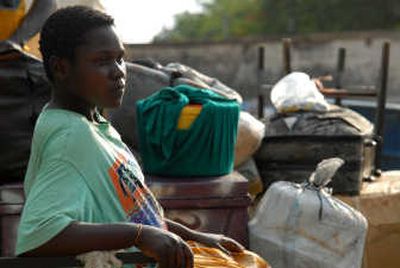Kenyans say police are divided

NAIVASHA, Kenya – Benson Onyango slipped behind the door of his house, terrified as he watched about two dozen young men chase his friend down the dirt paths of their neighborhood in this lakeside town. His friend stumbled to the ground, and the gang began beating him with clubs and iron bars.
Onyango scanned the neighborhood for anyone who could help, he recalled, and felt a flash of relief when he saw 10 police officers on a slope nearby. But seconds passed, and the police just watched, he said. He called out for them to do something. They finally fired several bullets into the air, but the beating continued.
“At long last, they cut his neck,” said Onyango, who now lives amid heaps of mattresses and clothes at a local police station, his only potential refuge, and still fears for his life. “The police, they saw what was happening, and they did nothing.
“The police were from their tribe,” the Kikuyu, he said of the gang. “So they tried to defend their people to do what they wanted.”
In the violent weeks since this country’s disputed Dec. 27 presidential election, traumatized Kenyans have repeatedly accused police of failing to protect them. They say officers have run away from machete-wielding gangs and local militias, or stood by and watched as their brothers, sisters, husbands, wives and neighbors were butchered and their homes burned to the ground. In some cases, officers are accused of egging on or assisting the attackers. Opposition leaders have also repeatedly accused the police of gunning down unarmed demonstrators.
In the best of times, the police here are a poorly paid force often accused of human rights abuses and corruption. Government officials say they are now simply overwhelmed or lack clear guidance.
But many Kenyans believe the police are as dangerously divided as the country itself. Officers from President Mwai Kibaki’s Kikuyu tribe have been accused of allowing attacks on Luos and other ethnic groups loyal to opposition leader Raila Odinga, a Luo, while others say Kalenjin and Luhya officers have permitted attacks on Kikuyus.
Meanwhile, amid the prevailing insecurity, gangs and tribal militias are asserting greater control over swaths of western Kenya and Nairobi’s poorest neighborhoods, where groups that have taken names such as the Baghdad Boys and the Taliban, as well as an outlawed sect, the Mungiki, are recruiting hard.
The lack of trust in police protection is speeding the ethnic segregation under way across the country, where more than 600,000 displaced people are heading for regions where they feel safe – the Kikuyus to their ethnic homeland in central Kenya, and the Luos, Luhyas and Kalenjins to the west.
“The only problem we have now is one,” said John Oduri, a tailor whose shop was torched by gangs. He was spending his fifth night at the Naivasha police station, about 50 miles northwest of Nairobi, wearing clothes stained with his brother’s blood. “We want to leave this place and go home.”